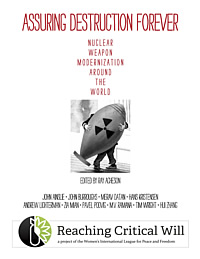New Article: French Nuclear Modernization

A new report describes worldwide nuclear weapons modernization efforts
By Hans M. Kristensen
The organization Reaching Critical Will has published a collection of articles about the nuclear weapons modernization programs that are underway in the various nuclear weapons states around the world.
My modest contribution is the chapter on France (pages 27-33).
The report – Assuring Destruction Forever – illustrates that although the Cold War nuclear arms race has ended, a global effort to modernize and improve nuclear weapons is in full swing. For some regions (India-Pakistan and India-China) this effort has elements of an arms race, but for most countries it is about extending and improving a nuclear weapons capability indefinitely.
This should remind us why it is increasingly meaningless to assess nuclear arms control progress in numerical terms by comparing the sizes of today’s arsenals with those of the Cold War. Progress increasingly must be measured in constraint: yes, by reducing arsenals further, but perhaps more importantly by curtailing deployments, operations, missions, life-extensions, modernizations and improvements.
Otherwise, the dynamic efforts to extend and modernize the remaining nuclear arsenals may end up working against the nuclear arms control process. Because life-extension and modernization efforts are accompanied by declarations by the nuclear weapon states and alliances about the continued importance of nuclear weapons to national and international security, there is a risk that they will combine to reaffirm and prolong the nuclear weapons era instead of delegitimizing and shortening it.
This publication was made possible by a grant from Carnegie Corporation of New York and Ploughshares Fund. The statements made and views expressed are solely the responsibility of the author.
The last remaining agreement limiting U.S. and Russian nuclear weapons has now expired. For the first time since 1972, there is no treaty-bound cap on strategic nuclear weapons.
The Pentagon’s new report provides additional context and useful perspectives on events in China that took place over the past year.
Successful NC3 modernization must do more than update hardware and software: it must integrate emerging technologies in ways that enhance resilience, ensure meaningful human control, and preserve strategic stability.
The FY2026 National Defense Authorization Act (NDAA) paints a picture of a Congress that is working to both protect and accelerate nuclear modernization programs while simultaneously lacking trust in the Pentagon and the Department of Energy to execute them.